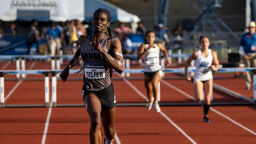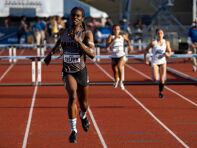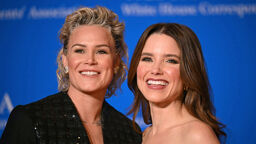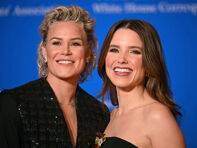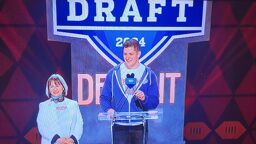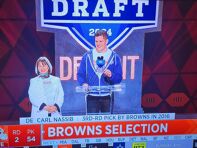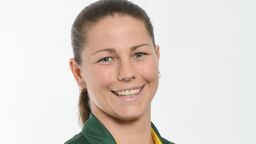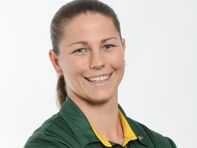Story from before 2003
It is a beautiful autumn afternoon in Charlottesville, Virginia, and Tyree Foreman has just scored the game-clinching touchdown against conference rival Maryland. As with every other home team touchdown celebration in Scott Stadium, the crowd celebrates with a rendition of "Good Old Song" – a long-standing tradition that goes back generations.
One of the lines in the song goes:
"We come from Old Vir-Gin-I-A,
Where all is bright and gay."
The contextual meaning of gay here, of course, is "happy." However, since the late 1970s, many in the student body have felt the need to emphatically declare their heterosexuality by adding a chant:
"We come from Old Vir-Gin-I-A,
Where all is bright and gay.
Not gay!"
This, of course, while every fraternity brother in the stands is locked in embrace watching guys in tight pants pile up on each other on the field.
The Lesbian Gay Bisexual and Transgendered (LGBT) Union on campus has long fought against the "not gay" "tradition", saying that it sends a message to the community that being gay is not OK. Given the limited number of openly gay students, and a general lack of respect on campus for the LGBT, the cries have fallen on deaf ears and the "tradition" continues every time the home football team scores.
But now, the few openly gay students at UVA have some surprising allies that are bringing "Not Gay" to the forefront of the University's internal discussions and are raising awareness about compassion and respect for gay students at Virginia.
Kyle Singer, 20, was incensed at a column in the school's student paper, The Cavalier Daily, in the beginning of April that defended the "not gay" cheer. The columnist claimed it was the same thing as saying "like Monopoly" after the line in Rudolph The Red-Nosed Reindeer that goes, "they never let poor Rudolph join in any reindeer games."
Singer is a sophomore at UVA. He's from the liberal state of Minnesota, where his parents taught him to respect everyone, including gay people. He's also one of the two starting goalies on the school's storied soccer team which has won five National Championships since 1989. He's also straight.
"It was the most ignorant article I'd ever read in my life," said Singer. "The idea that people could be so ignorant – I just couldn't understand it."
Singer had known of the issue since he started at UVA two years ago, but the article showed him how intolerant the student body still was. He went to the Student-Athlete Mentor (SAM) Council and urged them to take a stand against the "not gay" cheer. With SAM, he is now leading the charge among student-athletes to eradicate the "not gay" cheer from football games.
He and other members of SAM are circulating a petition to student-athletes in every sport. The petition asks the student body to refrain from celebrating the school's athletic accomplishments with the cheer, which in their minds only divides the student body. They are asking every varsity athlete to sign it.
"When I first brought the petition to my teammates," Singer said, "they thought it was a joke. They just laughed." Most of them have come around. Some still have not.
"As an athlete, there's a stigma that you have to be a man's man." Guys are trying to be cool, Singer said, and supporting gay tolerance isn't cool. "There's a lot of feeling among males that it's not cool to be sensitive."
Naturally, some have started whispering about Singer.
"I think I'd be ignorant to think people weren't questioning my sexuality. But that's fine. People can think what they want. I don't care what they think."
Right now, he says he's just concerned about standing up for the rights and feelings of his fellow students at UVA. "People didn't have to be black to be upset about slavery. People didn't have to be Jewish to be upset about the Holocaust." And, according to Singer, men don't have to be gay to be sensitive.
Singer and the other members of SAM join the university's Student Council in opposition to "not gay." The Council has, for several years, tried to figure out how to stop the chant. Making it a punishable offense would never work. A Student Council resolution condemning the cheer, which passed in 1998, is just words on paper – and the chant continues three years later. The hope of Singer and SAM is that their new involvement will start to undermine the culture that supports the cheer.
"[With the signed petition] we want to say that these are the people on the field that we're going to celebrate, and they're not cool with the cheer." Their hope is that, with this statement from the athletes, the traditional culture will finally understand the harm the "not gay" cheer can cause, and the "tradition" will go away. SAM also intends to build a presence at the football games next September, handing out fliers and openly encouraging fans to not say "not gay".
So far, the response from the student-athletes has been encouraging. Almost all of Singer's men's soccer team have signed the petition. He has also heard back from several other teams, including the men's and women's swim teams, that virtually all of their members have signed the petition. He won't know until Friday just how many signatures they have.
Regardless, getting students to stop the cheer will be no small feat. According to Kate Ranson-Walsh, 20, the university's LGBT Union president, the University of Virgina didn't even have an LGBT Resource Center until they opened one last October. And, being situated in the home state of anti-gay reverends Pat Robertson and Jerry Falwell also takes its toll on the overall sentiments of the student body. The state-run University didn't even admit women until 1970.
But, Singer is hopeful.
"Traditions that are hurtful to people or oppressive are made to be broken. Tradition isn't necessarily a good thing."



